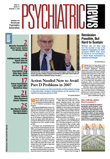“My life didn't turn out like I wanted,” a 37-year-old man with paranoid schizophrenia admitted. “I do not have a wife, I am unable to work, I have been hospitalized against my will. After all this, I consider myself happy. God gives me all I need.”
“When I read the Bible, it disturbs me,” a 47-year-old man with schizoaffective disorder reported. “I begin to think I've behaved wickedly, and then I believe I'm the devil.”
These comments are only two of many to emerge from what may be the first study of the role of religion as a coping behavior by individuals with psychosis. They also reflect the bright and dark influence of religion on such persons. And they mirror the major results of the inquiry, namely, religion helps most, but not all, of those who are burdened with psychosis.
Philippe Huguelet, M.D., a lecturer at the University Hospital of Geneva in Switzerland, and colleagues undertook their study, they said, because religiousness has been found to be highly prevalent among persons with schizophrenia in both Europe and North America, yet clinicians are often unaware of this and fail to integrate discussion of religion into their care of patients with psychosis.
Since no validated questionnaire existed for surveying religiousness among persons with psychosis, Huguelet and his group developed one. They then presented it to 115 individuals aged 18 to 65 who were being treated for schizophrenia or another psychosis in one of four psychiatric outpatient facilities in Geneva.
Questionnaire analysis revealed some telling data. Religion was important for 85 percent of subjects—in fact, for nearly half, it was the most important thing in their lives.
Huguelet had expected religion to be vital to their subjects, but not that critical, he told Psychiatric News. Part of the reason why it was so indispensable to them, he speculated, may be because it helped fill a void created by losses in their lives.
Furthermore, 82 of the subjects (71 percent) found that religion helped them cope with their illness and life in general. Said one, “If you tell yourself that you have an eternal life ahead of you, you know that the voices will end.” Commented another, “I feel that other people can control me from a distance and that they can do anything they want with me. However, I do not feel anxious as I did before. A Buddhist monk told me it was only my imagination, and he is teaching me how to meditate. In this way, I distance myself from the idea of control.”
Sixteen subjects (14 percent), however, stated that religion had a negative impact on their illness and life. “Religious teaching helps me, but I haven't found any warmth in relationships with people,” one subject said. Another noted, “When I go to church, I see dirty things, and I feel the devil taking my hand.” Four said they felt despair when religion did not heal them of their mental illness.
A little over half (54 percent) reported that religion dampened their psychotic symptoms. Ten percent, though, found that religion increased such symptoms.
“The focus on the pathological side of religion—religious delusions—has inadvertently contributed to the stigmatization of religion for people with schizophrenia,” Huguelet and his team concluded in their study report, which appeared in the November American Journal of Psychiatry. “Our study establishes a balance.... [Religion] can have a positive or negative impact on patients' lives.”
Their results, they wrote, also “indicate that the complexity of the relationship between religion and illness requires great sensitivity to each unique story.”
Huguelet told Psychiatric News that psychiatrists should discuss religion with their psychosis patients and focus on how it might contribute to their coping and recovery, not on whether it might make their illness worse.
“In Europe, most psychiatrists think that speaking of religion will lead to exacerbation of delusions,” he said.
The study had no outside funding. Huguelet and his team have received a grant from the Swiss national fund to continue their research on this topic.
